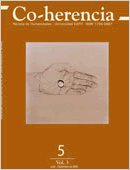The Goddesses and the Traveler. A reading of Parmenides’ Poem Proemium through the forms of Necessity and Legality
Main Article Content
Keywords
Parmenides, Necessity, Legality, Dike, Themis, Moira, Presocratic Thinkers.
Abstract
This text takes as its object the terms or names through which legality and necessity are presented in Parmenides’ poem proemium. An inquiry will be carried out on them, intending to restore the literary references that makes them comprehensible within the work structure of the thinker of Elea. With this purpose in mind, we will have recourse to Homer’s and Hesiod’s epic works. Thus the text is in the line of studies researching presocratic thought as a content within an intellectual context of higher diversity than the one prescribed by later systems of philosophical thought.
Downloads
References
Bowra, C. M. (1937) «The Proem of Parmenides». En: Classical Philology Vol. 32, Nº 2.
Burkert, W. (1969) «Das Proömium des Parmenides und die Katabasis des Pythagoras». En: Phronesis 14.
Cornford, F. M. (1987) Principium Sapientiae. Los orígenes del pensamiento filosófico griego. Traducción de Rafael Guardiola. Madrid, Visor distribuciones.
Detienne, M. (1983) Los Maestros de la Verdad. Taurus.
Eggers Lan, C. (1997) Libertad y Compulsión en la Antigua Grecia. Buenos Aires, Universidad de Buenos Aires.
Echavarría, S. (2005) «Parménides, fragmento 1». En: Coherencia Nº 2 Vol. 2. pp. 9-36.
Furley, D. (1973) «Notes on Parmenides». En: Exegesis and Argument. Ed. Lee, E.;Mourelatos A. and Rorty, R. New York, Phronesis Supp. Vol. I. pp. 1-15.
Gadamer, H. G. (1995) Los inicios de la filosofía. Barcelona, Paidós.
Gagarin, M. (1973) «Dike in the Works and Days». En: Classical Philology Vol. 67, Nº2.
Gómez-Lobo, A. (1985) Parménides. Texto griego, traducción y comentario. Buenos Aires, Charcas.
Guthrie, W. K. (1993) Historia de la Filosofía Griega. Madrid, Gredos, Vol. II.
Guthrie, W. K. C. (1967) Los filósofos griegos de Tales a Aristóteles. México, Fondo de Cultura Económica.
Havelock, E. (1958) «Parmenides and Odysseus». En: Harvard Studies in Classical Philology Vol. 63, pp. 133-143.Hesíodo.Obras y Fragmentos. Traducción de Aurelio Pérez (1997) Madrid, Gredos.
Bernabé Pajares, Alberto (Trad., 1978) Himnos homéricos. La Batracomiomaquia.: Madrid, Gredos.
Homero. Iliada. Traducción de Emilio Crespo (1996) Madrid, Gredos.
Homero.Odisea. Traducción de José Manuel Pabón (1996) Madrid, Gredos.
Jaeger, W. (1992) La teología de los primeros filósofos griegos. México, Fondo de Cultura Económica.
Jaeger, W. (1994) Paideia. México, Fondo de Cultura Económica.
Liddell, H; Scoot, R. (1953) A Greek-English Lexicon. Gran Bretaña, Oxford-ClarendonPress.
Morrison, J. S. (1955) «Parmenides and Er». En: Journal Of Hellenic Studies.
Mourelatos, A.(1970) The Route of Parmenides. New Haven, Yale University Press.
Mourelatos, A. (1965) «and its derivatives in Parmenides». En: Classical philology, 60, pp 261-262.
Northrup, M. (1980) «Hesiodic Personifications in Parmenides A 37». En: Transaction of the American Philological Association (110), pp. 223-232.
Owens, J. (1979) «Knowledge and Katabasis in Parmenides». En: Monist Vol. 62, Nº1, pp.15-29.
Pelliccia, H. (1988) «The text of Parmenides B1.3 (D-K)». En: American Journal of Philology. Vol. 109. pp. 507-512.
Posada, M. C. (2003) «El enigma, lenguaje de Parménides». En: Estudios de FilosofíaNº 26, pp. 13- 22.
Sánchez Ruipérez, M. (1960) «Historia de en Homero». En: Emérita Vol. 28, pp. 99-123.
Tarán, L. (1965) Parmenides. A text with Translation, Commentary and Critical Essays.New Jersey, Princeton University Press.
